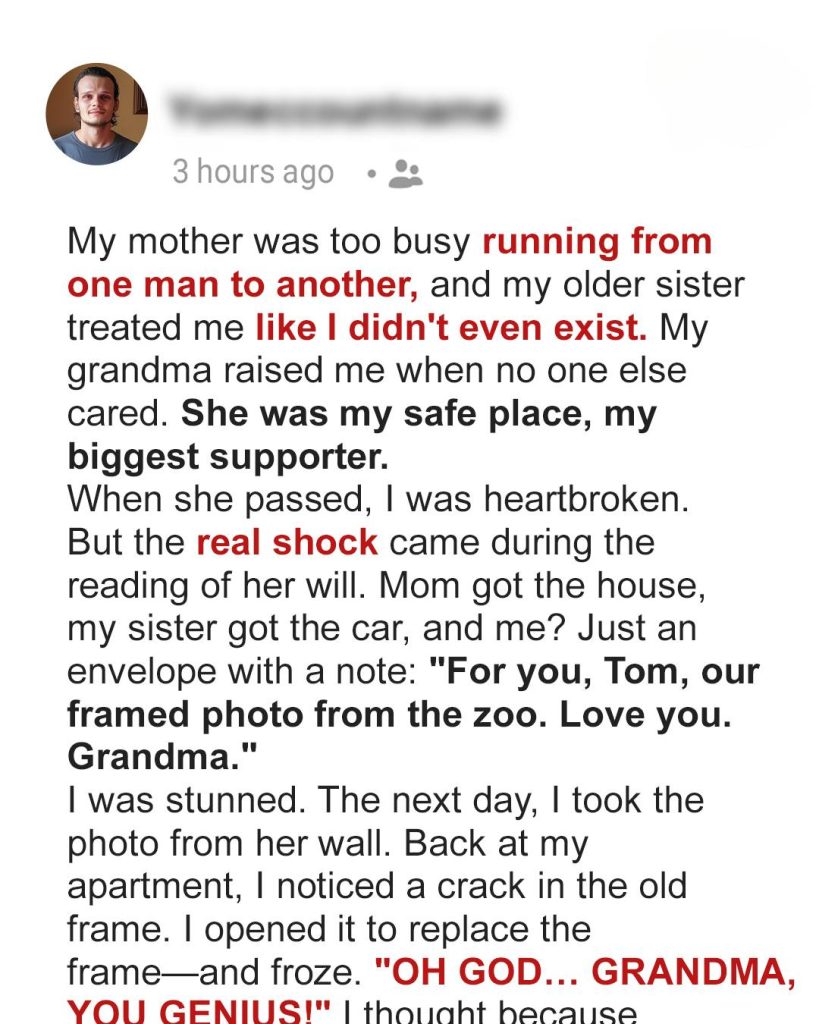I thought the joke was on me.
When my grandmother, Grace, died, my mother and sister split the big stuff like it was already labeled: the house my mom had been eyeing for years and the car Cynthia had “borrowed” so often it already smelled like her perfume. At the reading, the lawyer handed me a single wrapped package—an old photo of Grandma and me at the zoo. I was six, hair in lopsided pigtails, her hand wrapped around mine while a giraffe bent down like it was bowing to her.
That was it. No house keys. No numbers. Just a frame and a memory.
I drove home angry. I set the picture on my kitchen table and told myself it was proof I didn’t matter—not to them, maybe not even to her. But the frame was cracked along one corner, and the chip bothered me. Habit more than hope, I pried the backing up to replace it.
The envelope slid out like a secret taking a breath.
It was thin and yellowed, sealed with a piece of floral tape I recognized from her sewing kit. Inside: stock certificates, bank statements, a neat list in her looping handwriting, and a key taped to an index card that read simply, “For when you’re ready.”
The next morning I stood in front of a safety deposit box, palms sweating. The banker slid it toward me and left me alone. I lifted the lid and stared.
Rental property deeds. A ledger of dividend payments. A quiet, disciplined abundance. Tucked at the bottom: the deed to the land under my grandmother’s house—the same land my mother assumed she now controlled. Grandma hadn’t forgotten me. She had made a choice. Not to spoil, but to trust.
I sat there on the tiny stool in the vault and cried in that ugly, grateful way that makes your shoulders shake. It wasn’t just money. It was a map.
I bought the house back, land and all. Then I pulled up the carpet, scrubbed sunlight back into the windows, and painted the front door the exact green of Grandma’s favorite cardigan. I turned the parlor into a little library with sagging, well-loved shelves; the dining room became a soup-and-bread kitchen that always—always—smelled like garlic and rosemary. On the stoop, I screwed in a brass plaque: Grace’s Corner.
Word spread the way it always does in towns like ours—through coffee lines and barber chairs, through whispers at the PTA and the cashier who tells you when the tomatoes are really ripe. Kids came first, slipping in after school for the comic books and apples. Then their parents, curious, then hungry, then relieved. People who didn’t fit anywhere else fit here. Nobody asked for papers. Nobody asked why. You got a book, a bowl, and a place to sit. You cleared your plate when you were done. You left better than you arrived.
The first night the radiator hissed to life, I caught myself setting two mugs on the counter—one for me, one for her. Old habits. I kept doing it.
Months later, Cynthia showed up on the sidewalk, arms wrapped around herself like she could hold her life together if she just squeezed hard enough. Mascara spidering under her eyes. She didn’t ask for money; she asked for a chair.
“I messed up,” she said, staring at the floorboards. “Again.”
I poured her coffee and let her talk until the heat left the mug. When she finally went quiet, I said, “I won’t hand you cash.” She flinched, then nodded like she expected that. I slid a folded apron across the table. “But I will hand you keys. Come in the morning, start with dishes. Then prep. Then the register. If you stay, you stay because you’re useful. Be someone Grandma would point at and smile.”
She looked at the apron like it might bite her. Then she took it. The next morning she was there at seven, hair up, sleeves rolled. She washed pots until her fingers pruned, then served soup, then listened to a boy explain his science project like it mattered. At closing she swept in slow, patient lines and whispered, “I forgot what it felt like to belong.”
That’s when I understood what the photo really was. Not an heirloom—an instruction.
My grandmother didn’t leave me a prize to hoard. She left me a responsibility to spend. Not on marble countertops or vacations with resort bracelets, but on something that multiplies when you give it away. The kind of wealth that shows up as a kid’s mouth stained with blueberry pie, as a book tucked under an arm, as a woman who hasn’t been seen in a while standing a little taller because someone said, “Sit. Eat. Tell me.”
Sometimes I still hold the old zoo picture by the window so the sun catches the giraffe and our tangled hands. On those days, the house hums. The bell over the door laughs. Someone’s arguing, softly, about whether the hero should have forgiven the villain; someone’s grandmother recipe just walked in wearing a wool coat and a shy grin. And I swear, for a second, I can smell Ivory soap and spearmint, and hear the rustle of a cardigan sleeve.
People ask me what she left me. I say everything.
It just didn’t look like it at first. It looked like a cheap frame with a crack in the corner. It looked like being overlooked. It looked like an empty hand that, when I turned it over, was full.
Love, disguised as trust.
A mission, disguised as a photograph.
Grace’s Corner is hers as much as mine. Every warm bowl. Every “welcome in.” Every kid who leans against the counter and tells me the ending of a book before I’ve read it. Every stranger who leaves a little lighter than they came. That’s her. Still here. Still making a place at the table.
In the end, all she truly left me was love.
Turns out, that’s more than enough to build a life.


